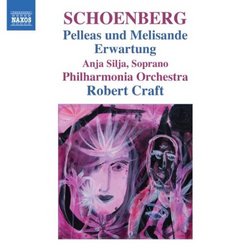| All Artists: Schoenberg, Craft, Philharmonia Orchestra, Silja Title: Schoenberg: Pelleas und Melisande; Erwartung Members Wishing: 0 Total Copies: 0 Label: Naxos Original Release Date: 1/1/2008 Re-Release Date: 8/26/2008 Genre: Classical Styles: Opera & Classical Vocal, Forms & Genres, Theatrical, Incidental & Program Music, Symphonies Number of Discs: 1 SwapaCD Credits: 1 UPC: 747313252725 |
Search - Schoenberg, Craft, Philharmonia Orchestra :: Schoenberg: Pelleas und Melisande; Erwartung
 | Schoenberg, Craft, Philharmonia Orchestra Schoenberg: Pelleas und Melisande; Erwartung Genre: Classical
|
Larger Image |
CD Details |
CD ReviewsSchoenberg's "Pelleas" and "Erwartung" with Robert Craft Robin Friedman | Washington, D.C. United States | 02/24/2010 (5 out of 5 stars) "Arnold Schoenberg (1874 - 1951) studied composition for a brief time with Alexander von Zemlinsky, but he was otherwise largely self-taught. His early compositions are lushly late-romantic in character. In 1909, Schoenberg's compositional style changed dramatically with a shift towards atonality. He would not compose in the "twelve tone" style for which he is most famous until the 1920s. An ongoing series of releases and reissues on the Naxos label by Robert Craft and the Philharmonia Orchestra offer the listener the opportunity to explore a great deal of Schoenberg's music. In this CD, Craft and the Philharmonia perform an early work, "Pelleas und Melisande" together with a radical work of Schoenberg's early maturity, the notorious "Erwartung". This music is difficult, but it offers insight into the composer and his development. "Erwartung" is properly regarded is one of his masterworks. Schoenberg composed "Pelleas und Melisande", opus 5 in 1902-03 under the inspiration of the play by Maurice Maeterlinck. Schoenberg was unaware at the time that Debussy was setting the same text as an opera. Jean Sibelius and Gabriel Faure were among other composers drawing inspiration from Maeterlinck's drama. The story is set in a forest, and its themes are the matters of romance and mystery: illicit love, vengeance, and eroticism. Schoenberg set the story in a tone-poem for large orchestra. The work is in a single movement of approximately 40 minutes. Greeted with disdain upon its initial performance, Schoenberg's Pelleas became one of his more accessible and popular works. Schoenberg's Pelleas owes a great deal to Mahler and Richard Strauss in its heavy, chromatic late romantic style. On first hearing, it struck me as overwrought and bloated. The work is heavily contrapuntal with each of the three protagonists in Maeterlinck's drama represented by an elaborate theme. The music changes in character between serenity, romantic passion, and vengeance and anger. The orchestral writing is full of color and solo passages for many instruments. Schoenberg is frequently denigrated for the allegedly overly-cerebral character of his music; but this charge cannot seriously be leveled at his early compositions. Rather, this work is overripe and emotive to a fault. I came to enjoy it more after several hearings, but late romantic excess is not my favorite type of music. It is valuable to compare "Pelleas" with "Erwartung" ["Expectation"] , opus 17, which Schoenberg composed in his pivotal year of 1909. This works is a "monodrama for soprano and large orchestra" which is in three short scenes and one long scene, all of which are interconnected. The work takes about 28 minutes to perform. A young medical student, Marie von Pappenheim, wrote the troubling text which Schoenberg set to music in about three weeks. The work remained unperformed until 1924 when it was performed in Prague under the direction of Zemlinsky. Soprano Anja Silja performs the demanding solo part in this recording. She has recorded "Erwartung" several times, and she displays great understanding of this score. In its music and in its text, "Erwartung" remains a quintessentially modernistic work. The vocal line is declamatory and wandering, on the border between speech and song. It covers an extraordinary emotional range from shrieks to sobs to passages of anger, wandering and disorientation. The music is both athematic and atonal, and is written to capture the stream of consciousness of its troubled protagonist. There are frequent rhythm and tempo changes in the piece. The large and varied orchestral writing mirrors the emotional trauma of the singer. Although both "Pelleas" and "Erwartung" were composed for large orchestra, the latter composition punctures the musical language of the former to establish a modernistic, taut musical voice. But "Erwartung" for all its modernism has many points of contact with its predecessors. It is romantic in its setting (a lonely forest) and in its intense subjectivism. The work takes the same romantic themes of "Pelleas" - frustrated female sexuality, love, anger, and murder - and intensifies them. The singer wanders through the forest searching for a lover whom she has herself earlier killed in a fit of jealousy. The music captures the heart of a lost, wandering, and disoriented individual. Schoenberg becomes a "modern" composer with this work, but he remains a composer who is fully tied to passion and feeling. These two works offer a good way to come to understand Schoenberg and to learn what changed and what remained constant in his musical development. They may not be the best works for those listeners just starting with the composer. "Erwartung" remains one of his most difficult and characteristic scores. It is probably not for everyone, but it will repay careful listening. Robin Friedman" Extraordinary Brian Morgan | New Orleans | 02/05/2009 (5 out of 5 stars) "This "Erwartung" is my "desert island" recording. It is utterly astonishing, with Anja Silja, one of the greatest of singing-actresses, heard in this most unforgettable and harrowing of operas."
|

 Track Listings (11) - Disc #1
Track Listings (11) - Disc #1